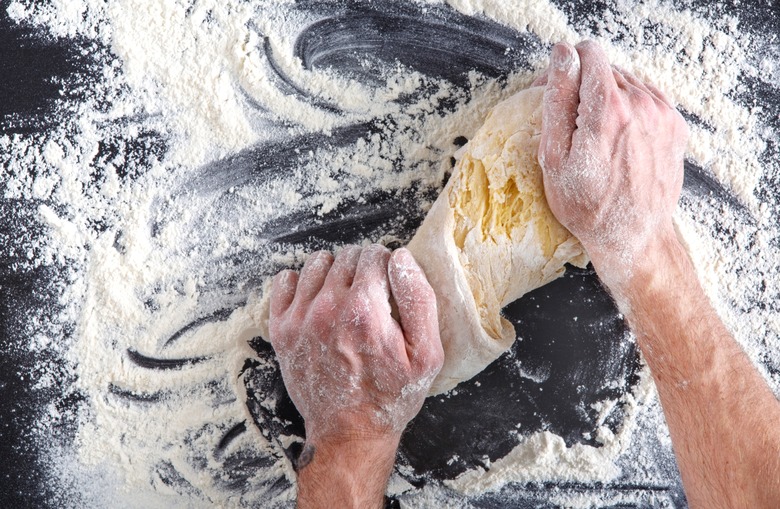Is 'Glutinous' A Word?
As a copy editor at The Daily Meal, I've probably read the word gluten more times in the past year than most people will in their lives. Because society remains gripped by mass hysteria over this pariah protein (and because celiac sufferers have a very legitimate reason to avoid it) we cover gluten a lot. And at times when gluten-free is the default — in pieces like 15 Thanksgiving Sides You Won't Believe Are Gluten-Free or 15 Myths About Gluten to Stop Believing, for instance — our writers sometimes cast about for a word that means "gluten-not-free."
They tend to land on glutinous, which has the advantage of not angering the spell-check gods, because it is a word. Unfortunately, its primary meaning has nothing to do with the word gluten as we currently use it — or, rather, little to do with it aside from a common origin.
Both words are basically about things being sticky. In Latin, gluten means "glue," and the word glutinous, meaning "glue-like," actually found its way into Middle English probably in the fourteenth century — a time before everyone became concerned that a substance in their hamburger buns was the fundamental cause of unhappiness.
The protein gluten (actually a mix of proteins containing glutenin and gliadin) is also named for its stickiness. Basically, cooks and scientists realized it was the reason why wheat flour gets gooey when mixed with water and why wheat paste actually makes a pretty good adhesive.
Before you run away screaming ("See? They've been feeding us glue this entire time!"), keep in mind that gluten's glutinousness is what makes it possible for bread to rise when leavened, for pastry crusts and biscuits to be rolled into thin, flaky leaves, and for pizza dough to be tossed into the air gracefully by a charming pizzaiolo wearing a sweaty undershirt. That gluten-free pizza crust totally sucks because it actually isn't enough like glue.
The problem is that people have been using glutinous for centuries to describe a whole variety of glue-like things, including adhesives made from other food products like eggs, milk, beeswax, or animal hides and connective tissues. It's also part of the most common name in English ("glutinous rice") for a delicious type of very sticky rice that is popular throughout Southeast Asia — and that does not contain gluten.
So glutinous doesn't actually refer specifically to the foods that your mom won't eat since she started her latest diet; it's really just anything that's sticky and gloopy.
How then is a writer to describe foods that are not gluten-free? Gluten-enslaved? Glutenful? Beglutened? Englutenated?
While it's typically more useful to explain a given food's wheaty properties as precisely as possible, glutenous (with an e) is also a word, and it can serve as an appropriate shorthand.
It's been around for quite some time as a variant spelling of glutinous, but it's much less common. More importantly, numerous dictionaries currently list glutenous as an adjective meaning "containing gluten." Considering the long history of glutinous as a way to describe things that are gooey, it makes sense to exclusively use this other spelling to describe foods that specifically contain delicious, stretchy gluten. So if your spell-check tries to make you replace the e with an i, please don't — unless you're just writing about something sticky.
Many things that are glutenous are not actually glutinous — a saltine cracker, for instance, or a crunchy ginger snap. Of course it's possible for foods to be both glutenous and glutinous — say, an over-thickened gravy — but if you're looking for something guaranteed to be neither, try one of the 10 best gluten-free vodka brands.
